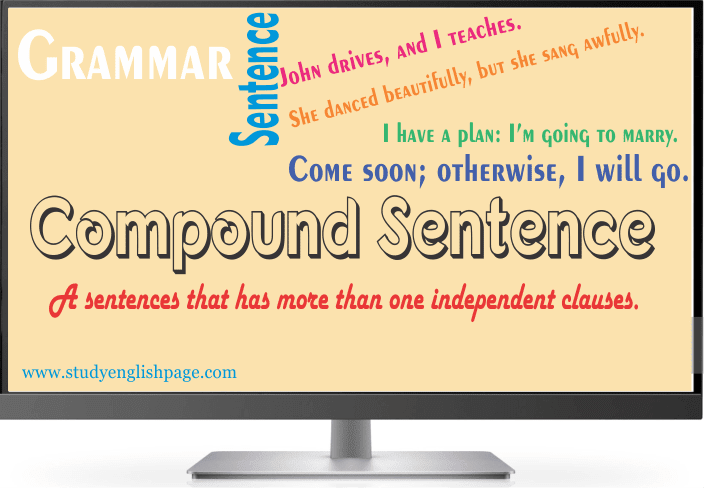Compound Sentences in English Grammar
Sentence
Let’s
first discuss the sentence. It is a group of words conveying complete meaning
or thought. A complete thought can be conveyed as a statement, a command, an
exclamation, or a question.
The
basic thing in a sentence is a complete thought. Every group of words can’t be
a sentence. The main condition is giving complete meaning.
- She hoarded data for her thesis. (Sentence)
- Studying English at night (Not a sentence)
As
we know that sentences have four types structurally. In this article, we are
discussing compound sentences. You can study the remaining types like simple
sentences, complex sentences, and compound-complex sentences on the site of
Study English Page.
Definition of Compound Sentence
A compound sentence is
defined as a sentence that has two or more than two independent clauses joined
by a conjunction or a suitable punctuation mark. More simply, a compound
sentence is a combination of at least two simple sentences. Each part of the
compound sentence gives a complete thought but adds more to the meaning of the compound sentence.
- John drives, and Jack teaches.
- I can speak English, but she can’t speak English.
The above sentences are
compound. They have more than one independent clause joined by
conjunctions. You can make two simple sentences from each sentence by omitting
the conjunction.
- She writes articles; I edit them.
This is also a compound sentence. It has two independent clauses joined by a punctuation mark. The two independent clauses can stand alone by themselves if you want to separate them.
More Examples of Compound Sentences
- Ali studies and Diya teaches.
- I called her, but she did not attend.
- I want to lose weight, yet I eat more fats.
- She danced beautifully, but she sang awfully.
- Come soon, and I will be waiting for you there.
- She tried her best to meet me, but I did not want.
- He achieved his life goal: he started his own business.
- I have come to the supermarket, so I can buy vegetables.
- Ali went to school; Diya went to college, and I went to the office.
- I don’t want to stop eating fats, nor do I want to listen to anyone.
- I often visit Study English Page and Grammarly; I prepare lectures from these two sites.
Formation of Compound Sentences
There are three basic ways
to form compound sentences. Compound sentences consist of independent clauses.
To construct a compound sentence, you need to use coordinating conjunction,
colon, or semicolon.
Using Coordinating Conjunction
Using coordinating conjunction
is one of the most common ways to join independent clauses. When independent
clauses are joined, a compound sentence is formed.
- We can make a peaceful society, and we can destroy it.
- Violence makes a society destroyed, but peace brings happiness.
Using Colon
By using a colon we can join
independent clauses to make a compound sentence. Remember that we use a colon
when an independent clause explains, illustrates, or paraphrases the previous
one.
- He showed his loyalty: he helped his friend.
- I have a plan for my near future: I am going to marry.
Using Semicolon
A semicolon can be used
between independent clauses. It can also be used to replace coordinating
conjunction. When a semicolon is used between independent clauses, it will
become a compound sentence.
- She will come tomorrow; I don’t want to meet.
- I bought an old, cheap, and well-designed car; but now I want to sell it.
Key Points
Appropriate Punctuation Marks
Using punctuation marks
is so important to make compound sentences. You need to use appropriate
punctuation marks. A comma is used before coordinating conjunction to join
independent clauses. As mentioned earlier in the formation, we use a colon and
semicolon to join independent clauses.
Semicolon
- I will give you a letter; you will send him.
- She will come tomorrow; I will discuss your problem.
Colon
- I have a plan for you: you should resign from this post.
- I have a plan for my near future: I am going to visit New York.
Comma
- I like walking early in the morning, but I don’t like running.
- Ali distributed candies among the students, and the students thanked them.
Using Independent Clauses
A compound sentence has at
least two independent clauses joined by a coordinating conjunction, colon, or
semicolon. Sometimes, a dependent clause is mistakenly used in a compound sentence.
A sentence that has a dependent clause can’t be a compound sentence.
- The accountant prepared a bill, and I sent it to the manager. (Compound sentence)
- If the accountant prepares a bill, I will send it to the manager. (Not a compound sentence)
Conjunctive Adverbs
Conjunctive adverbs are
also used to join independent clauses. When a conjunctive adverb is used, it
must be followed by a comma and preceded by a semicolon.
- Adela loves John; however, John does not love her.
- You must study hard; otherwise, you will be failed.
- Types of sentences
- Declarative Sentences
- Command Sentences
- Questions
- Exclamations
- Simple Sentences
- Complex Sentences
- Compound Complex Sentences
- Compound vs Complex Sentences





0 Comments